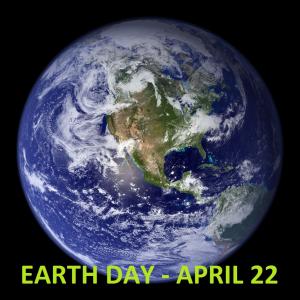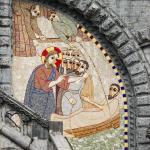
The story of Balaam should serve us all as a warning this Earth Day. Balaam, it seems, had some level of prophetic ability, but he used it for his own benefit, and not for the glory of God. He was selfish to the core and cared not who he hurt so long as he benefited from it. He did not consider the value of his beast of burden, his ass, but abused it when it angered him Thus, we read, that when an angel was sent to stand in his way and stop him from acting recklessly against the people of Israel, his ass, upon seeing the angel, moved aside:
And the ass saw the angel of the LORD standing in the road, with a drawn sword in his hand; and the ass turned aside out of the road, and went into the field; and Balaam struck the ass, to turn her into the road. Then the angel of the LORD stood in a narrow path between the vineyards, with a wall on either side. And when the ass saw the angel of the LORD, she pushed against the wall, and pressed Balaam’s foot against the wall; so he struck her again. Then the angel of the LORD went ahead, and stood in a narrow place, where there was no way to turn either to the right or to the left. When the ass saw the angel of the LORD, she lay down under Balaam; and Balaam’s anger was kindled, and he struck the ass with his staff (Num. 22:23-27 RSV).
Balaam abused his ass. He did not consider why his ass was acting up; he did stop and think that perhaps his ass was acting in his own best interest. It was moving, not according to Balaam’s wishes, but in order to meet the need of the situation, to move Balaam away from the avenging angel. But then, we are told, a miracle happened:
Then the LORD opened the mouth of the ass, and she said to Balaam, “What have I done to you, that you have struck me these three times?” And Balaam said to the ass, “Because you have made sport of me. I wish I had a sword in my hand, for then I would kill you.” And the ass said to Balaam, “Am I not your ass, upon which you have ridden all your life long to this day? Was I ever accustomed to do so to you?” And he said, “No.” Then the LORD opened the eyes of Balaam, and he saw the angel of the LORD standing in the way, with his drawn sword in his hand; and he bowed his head, and fell on his face. And the angel of the LORD said to him, “Why have you struck your ass these three times? Behold, I have come forth to withstand you, because your way is perverse before me; and the ass saw me, and turned aside before me these three times. If she had not turned aside from me, surely just now I would have slain you and let her live.” Then Balaam said to the angel of the LORD, “I have sinned, for I did not know that thou didst stand in the road against me. Now therefore, if it is evil in thy sight, I will go back again (Num. 22:28-34 RSV).
In this story, we are shown that animals should be respected and treated properly and not be abused. They are creatures of God whom God also loves. Those who abuse them sin and will face the consequences of their sins. All of God’s creatures have their gifts and abilities. All of them should be respected. They have their own walk with God, their own awareness of the world around them, an awareness which differs from our own, an awareness which allows them to see and experience things which we normally cannot do. We should respect that difference and what animals think and experience, so that if they act in a strange way, we do not immediately abuse them like Balaam did, but rather, consider what it is they are doing and try to ponder why and see if the animals might know something which we do not.
What is shown in the story of Balaam and his ass is the value God holds for all life, not just human life. Everything which was made was made good and has a value of its own. “And God saw everything that he had made, and behold, it was very good” (Gen. 1:31a RSV). Humans are called to respect the created order, to look after it as stewards over creation; our dominion is to be a dominion of love, not of power and control. We are called to look after the world and all that is in it. We are called to preserve the Earth, not abuse it when it does not grant what we wish from it. Just as Balaam suffered from the wrath of God for his sin against his ass, so we risk the wrath of God for our sins against creation. Indeed, Scripture warns us that God will reprove the “destroyers of the earth” (cf. Rev. 11:18 RSV).
All creation is good, and all of it deserves our loving guidance; we must not abuse the power and authority given to us. We must not imitate the careless abandon and selfishness of Balaam. Rather, we must look to the example of the saints who have upheld a harmonious relationship with creation, saints like St. Francis of Assisi or St. Seraphim of Sarov, and engage creation with the same care and joy they possessed in their lifetimes. Similarly, we must find what we can learn from the story of Noah. He was concerned for what happened to the Earth. He took great care to preserve and protect God’s creation, so that when the deluge came, life could and would go on.
The themes associated with Earth Day are themes found in the lives and examples of the saints, and if we ignore those themes, we do a disservice to our own tradition and faith. Pope Francis, therefore, rightfully points out that we are responsible for the Earth and what happens on it:
This responsibility for God’s earth means that human beings, endowed with intelligence, must respect the laws of nature and the delicate equilibria existing between the creatures of this world, for “he commanded and they were created; and he established them for ever and ever; he fixed their bounds and he set a law which cannot pass away” (Ps 148:5b-6). The laws found in the Bible dwell on relationships, not only among individuals but also with other living beings. “You shall not see your brother’s donkey or his ox fallen down by the way and withhold your help… If you chance to come upon a bird’s nest in any tree or on the ground, with young ones or eggs and the mother sitting upon the young or upon the eggs; you shall not take the mother with the young” (Dt 22:4, 6). Along these same lines, rest on the seventh day is meant not only for human beings, but also so “that your ox and your donkey may have rest” (Ex 23:12). Clearly, the Bible has no place for a tyrannical anthropocentrism unconcerned for other creatures.[1]
Earth Day should not be disregarded by Christians, but welcomed as a reminder of our duty to the Earth itself. If Balaam was justly reproached for abusing his ass, so we are justly reproached for our abuse of the Earth. We should look to all the life which we have harmed, all the life which has gone extinct because we have not acted as good stewards of the Earth, and mourn. We should look to all the waste and destruction which has come in the wake of our activity and repent of our sins, crying up to God, asking for mercy for ourselves and for the Earth as a whole. We must look at what we have done. We must be willing to change our ways:
It is becoming more and more evident that the issue of environmental degradation challenges us to examine our life-style and the prevailing models of consumption and production, which are often unsustainable from a social, environmental and even economic point of view. We can no longer do without a real change of outlook which will result in new life-styles, “in which the quest for truth, beauty, goodness and communion with others for the sake of common growth are the factors which determine consumer choices, savings and investments”. Education for peace must increasingly begin with far-reaching decisions on the part of individuals, families, communities and states. We are all responsible for the protection and care of the environment. This responsibility knows no boundaries.[2]
This Earth Day, let us not take the Earth and all that is on it for granted. Let us not ignore our responsibility to God’s creation. Let us rather, work with all those of good will, with all those who know and understand that our interdependent relationship with the Earth and all that lives on it. Every Earth Day serves as a time for us to consider how the Earth has fared in the previous year, for us to look back and see whether or not we truly are taking our responsibility seriously. We must truly do what we can to preserve and protect all that lives on the Earth. Have we done our duty, or have to just shrugged it aside, or worse, have we tried to undermine those efforts which seek to protect the Earth from the abuse we have done to it? We must not reject the value of Earth Day. We must not think it reflects some sort of non-Christian or anti-Christian worship of the Earth. Rather, it is the day which we, as a people, must come together and truly reflect on what we have done and what needs to be done in the future. We must do what we can to preserve and protect all that lives on the Earth. It is our duty. It is our responsibility. If we do not do so, we risk not only finding ourselves reproved like Balaam, but losing all things, for if the Earth and its environments are not properly protected, all life on it can perish.
[1] Pope Francis, Laudato si’. Vatican translation. ¶68.
[2] Pope Benedict XVI, “Message for the 43rd World Day of Peace” (1-1-2010). ¶11.
Stay in touch! Like A Little Bit of Nothing on Facebook.
If you liked what you read, please consider sharing it with your friends and family!















